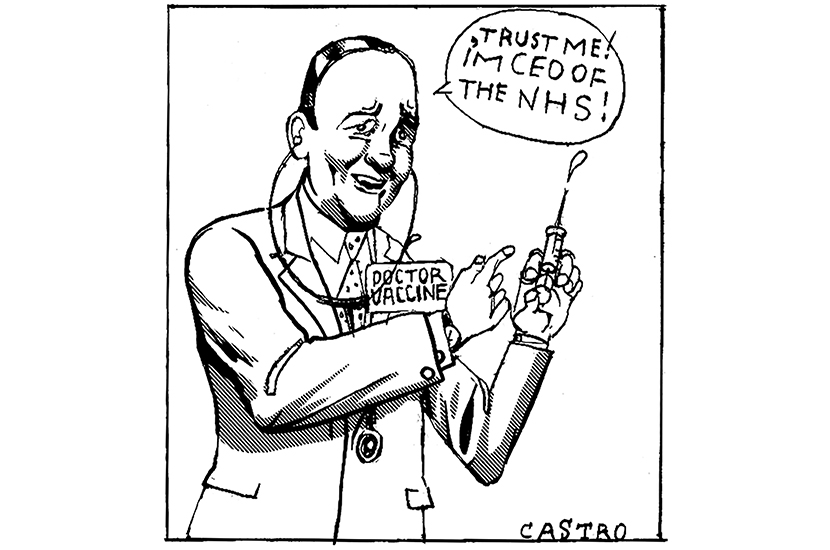Across Europe, hospitals have been filling up again with the second wave of coronavirus. France, Belgium, Germany, Switzerland and the Netherlands have all been hit, as has the Midwest of the United States. In England we’ve gone from fewer than 500 Covid-positive patients in hospital at the start of September to nearly 15,000 now. Each morning, we anxiously scrutinise the overnight figures. Thankfully, in the past week Covid inpatient numbers have begun to plateau — although they’ve still been rising in parts of the Midlands, London and Kent. So it’s an uneven picture. But unlike in March, community testing gives hospitals advance warning, so we’re able to adjust the provision of local health services almost in real time. This minimises the knock-on effect on other services. So NHS hospitals are now caring for 20,000 more non-Covid emergency inpatients each day than when they last had 15,000 Covid patients. Compared with spring they’re also performing three times more routine operations, and cancer treatments and GP appointments are mostly back to usual levels. All this is far better for patients, but it certainly does put brilliant NHS staff under even greater strain. Throughout the pandemic, the public have shown amazing support for their skill and dedication. Rather than say ‘Protect the NHS’, health service staff prefer to say: ‘Help us help you.’ Keeping coronavirus under control means we avoid displacing other treatments which our nurses, doctor and therapists desperately want to sustain. That’s why the run-up to Christmas is important: we need to see Covid infections and inpatient numbers drop decisively before we face more winter pressures, and the risk of a third wave.
After encouraging news about three different vaccines, the NHS is gearing up for what will be the biggest mass vaccination campaign in history. Of course, no one is counting any chickens until the independent regulators pass judgment but GPs, pharmacists, hospitals, councils, volunteers and our outstanding Armed Forces are all getting ready to help deliver the jab to millions. As the Health Secretary has announced, phased supply necessarily means most high-risk people will be vaccinated between January and Easter. We shouldn’t lose sight of the extraordinary medical innovation of the past nine months — worthy of Pasteur, Jenner and Koch. As well as volunteers in the vaccine trials, more than half a million patients have enrolled in other clinical trials and research studies. They’ve helped identify treatments that work and — just as importantly — those that don’t (including President Trump’s early favourite, hydroxychloroquine). Despite the pandemic and its disruptions, we’ve also quietly been getting on with introducing new treatments for other conditions. NHS cystic fibrosis patients are receiving new triple therapy. We’ve funded new ‘tumour agnostic’ cancer drugs, and this week the Chancellor has announced a boost for mental health services — where need has, clearly, intensified during lockdown.
The NHS is also now beginning to get sorely needed funding for hospital buildings, some of which date back to Victorian times. Boris Johnson previously made the pledge on a visit to North Manchester General Hospital, first built when Benjamin Disraeli was Prime Minister. That’s nothing compared with St Bartholomew’s Hospital, which marks its 900th anniversary in 2023. Less historic — but, to me, just as pleasingly — the list of upgrades includes a new community hospital for Consett in County Durham, where I started work in the NHS 32 years ago. After the steelworks closed, Shotley Bridge hospital was the last big employer. Ex-steelworkers found themselves working in the hospital laundry; one of our ward sisters ran the pub next door. If ‘levelling up’ is for real, it’s going to be felt in places like Consett.
As the son of English Baptists, married to a Jewish New Yorker, I’m largely spared family conflict over the holidays. We celebrate Christmas here; Passover and Thanksgiving with my in-laws. This year of course it had to be a Zoom Thanksgiving on Thursday. But I scored bonus points by signing my in-laws up for the National Gallery’s wonderful online tour of the Artemisia Gentileschi exhibition. Meanwhile, this week’s finale of the Great British Bake Off encouraged my children’s Thanksgiving efforts. Alongside doing the show, Prue Leith has been casting a friendly eye over the quality of hospital food. When the NHS was created, 190 hospitals were still running their own farms. Their 40,000 acres sustained market gardens, pedigree cattle, 5,000 sheep, 25,000 pigs and 63,000 chickens. No one is suggesting that again — but good food and good health are obviously connected.
Lockdowns across Europe have taken their toll on sport. But after rediscovering over the past few years my love of sailing, I’m now following a genuinely epic event which has not been locked down: the Vendée Globe. A single-handed, non-stop, round-the-world yacht race, nothing beats it for endurance and human spirit. Of the 32 skippers this time, six are women, including our own Pip Hare. And until his boat was damaged, her fellow Brit Alex Thomson was leading for most of the first fortnight, with a shot at becoming the first non-Frenchman to win the competition. So why — as a nation of seafarers — is the race largely unnoticed here, when across the Channel it rivals the Tour de France?
Sir Simon Stevens will be speaking at The Spectator’s Health Summit on 7 December: see tv.spectator.co.uk





Comments